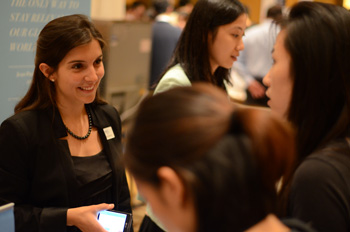|
August 27, 2016
Prime enrollment time as stature of region's schools is on the rise
Japan saw a rise in MBA opportunities to match the growth seen across the Asia-Pacific as a whole, according to the newest research from QS. Will the latest attempts to reinvigorate the country's economy now also provide a boost to salary levels on offer to holders of the qualification?

MBA program representatives and those who are thinking of taking an MBA course take part in the QS World MBA Tour, which is held annually all over the world. QS
The increasing demand for MBA talent in Asia-Pacific has continued unabated, surpassing the expectations of QS' annual research into the employment opportunities open to MBA holders.
Back in 2014, the "QS TopMBA.com Jobs & Salary Trends Report" concluded that we might have to expect steadier and more sustainable increases to employers' MBA hiring inclinations, after years of rapid growth in the region decelerated to a level of 11 percent across 2013-14. However, the 2015-16 edition instead showed a further 18 percent rise in opportunities across 2014-15 for new holders of the qualification with recruiters in the Asia-Pacific region.
Japan, perhaps the Asia-Pacific's most mature market for MBA recruitment, may not have been able to match the continued rises in MBA hiring over the past year seen in India and China. However, employer respondents in the country did report a significant 17 percent rise in new opportunities that comes close to matching the growth seen across the Asia-Pacific region as a whole. The extent of this growth — a marked improvement on the 10 percent rise reported by employers in Japan across 2013-14 — means the country now resides in 13th place in the worldwide table for the size of its MBA employment market, one spot above Russia. One highlight noted among QS' pool of employers was the growth in MBA demand emanating from Japan's manufacturing and engineering sectors.
Salaries awaiting boost
In terms of the salary levels MBA graduates might expect from employers in the Asia-Pacific, QS' research points to considerable variance, with averages ranging from highs above the $100,000 threshold in Australia and Singapore to lows teetering around the $20,000 mark in Vietnam and India. (Of course, one must factor the differing costs of living into this equation and it should be noted that the self-selecting nature of the survey means that we must read such figures as illustrative rather than precise).

A school representative explains their MBA program to a prospective student. QS
Japan currently finds itself somewhere in the middle of this spectrum, after employers indicated a fall in the average remuneration on offer between the years of 2014 and 2015. However, there will be hopes that the latest attempts of Prime Minister Shinzo Abe to reinvigorate the economy can provide the basis for a boost in this regard in the near future.
Employers in the Asia-Pacific as a whole were also found, in QS' jobs and salary report, to be keen on bringing in MBA talent from outside of the region, as well as from within. In fact, around one in 10 respondents indicated that they are not looking to recruit from within the region. The established business education markets of North America and Western Europe are the most commonly targeted in the battle for leading MBA talent — by 34 and 29 percent of employers across the Asia-Pacific, respectively.
Asia as global elite
This should by no means be seen as a denouncement of the quality of MBAs produced within the region. In reality, Asia's best business schools appear increasingly well-positioned to jostle with the North American and Western European elite.
One thing that needs to change, however, before MBA programs in Asia-Pacific truly join the global elite, is the extent to which they can capture the imaginations of the most talented prospective students from outside the region. Only Australia and Singapore currently stand among their 10 most-favored study destinations, according to QS's latest research into the preferences and ambitions of international applicants.

MBA program representatives and those who are thinking of taking an MBA course take part in the QS World MBA Tour, which is held annually all over the world. QS
Interest in Hong Kong is on the rise, but elsewhere the attraction appears somewhat hampered, with the exception of students who possess a natural inclination to seek out international immersion and adventure. Others may still be wary of perceived cultural and linguistic difficulties they might encounter and will settle instead for an exchange or study abroad option through a business school based in more familiar surroundings.
Having said that, senior figures from some of the region's top business schools are seemingly in agreement that belying the cultural context of individual nations in favor of adopting Western models of education is no solution in advancing the quality of the business education they provide. In March's second annual Asian Management Conclave, much of the discussion between representatives of business schools in 15 different countries, including Japan, was focused on harnessing lessons from within the region to maximize their effectiveness and competitiveness.
The business world has changed to the extent that the Asia-Pacific now presents crucial lines of inquiry no matter where in the world students choose to study and the region's leading MBA providers are fully aware of this. As the Chinese University of Hong Kong Business School's MBA programs director, Stephanie Villemagne, said in a recent interview " ... what you will not get exposed to in more traditional business schools in the West is the Asian perspective that is so crucial to the world economy's growth today."
Written by Tim Dhoul, a writer and editor at TopMBA.com
For more stories.
MBA tour offers information on world's top business programs
Survey shows graduate business degrees remain valued by employers
|